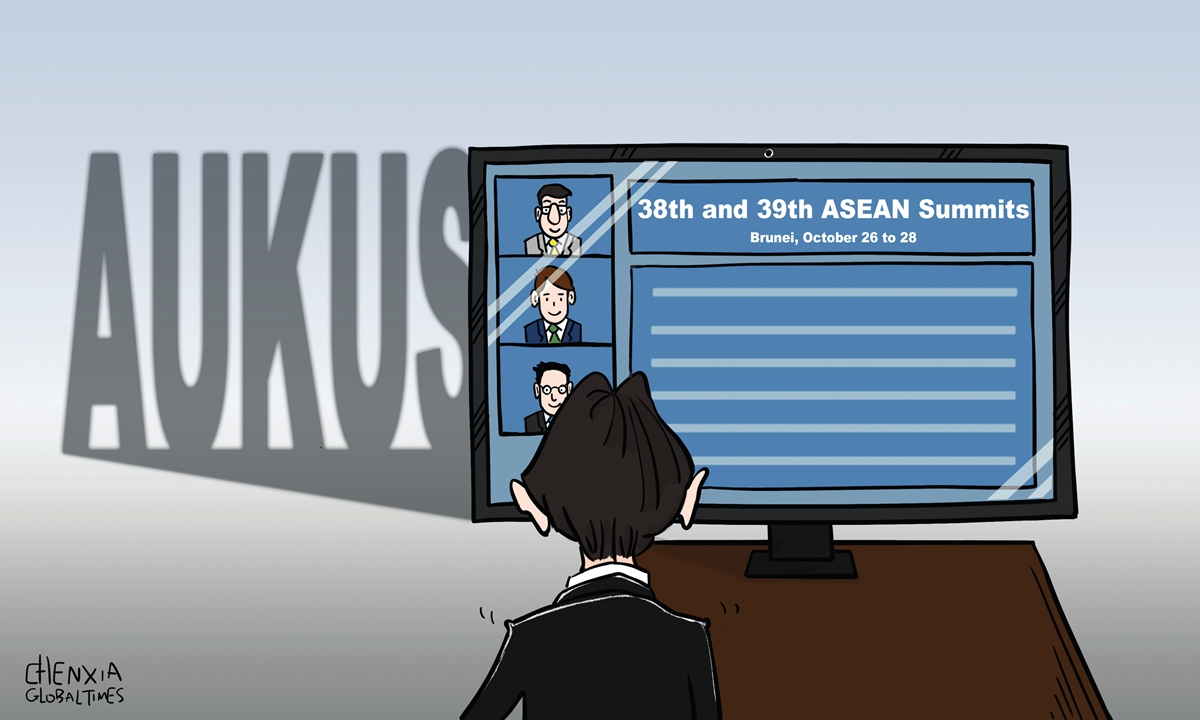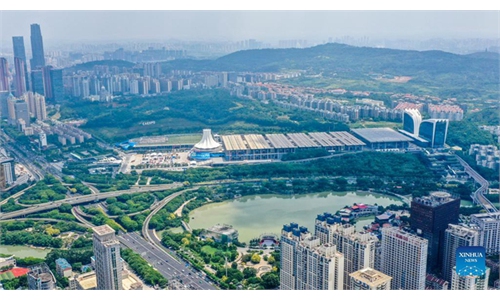
ASEAN summit underscores call for stability against external meddling Illustration: Chen Xia/GT
The 38th and 39th Association of Southeast Asian Nations (ASEAN) Summits and Related Summits held by video from October 26 to 28 in Bandar Seri Begawan, the capital city of Brunei, are of crucial importance. Under the theme "We Care, We Prepare, We Prosper," the meetings are focusing on the fight against the COVID-19 pandemic, development, and solidarity.
In the face of complex international situations, some believe that cooperation in East Asia and ASEAN should overcome all types of interference. It should push cooperation to move further steadily.
East Asia is one of the most dynamic and promising regions in the world. It has also become an important engine of the recovery of the global economy. The COVID-19 pandemic and its impact are among the most common regional concerns. The pandemic has not been completely eliminated so far. This will make the economic growth rate of many countries in the region lower than expected for this year.
One of the main channels of cooperation in East Asia is the ASEAN plus China, Japan, South Korea (10+3) cooperation mechanism. East Asian countries have taken several measures to jointly respond to the novel coronavirus.
On the one hand, these nations are strengthening cooperation in drug and vaccine research and development. They are also promoting the construction of a 10+3 emergency medical supplies reserve center and an ASEAN reserve warehouse.
In addition, they are improving the level of regional public health cooperation and emergency response capacity. On the other hand, the establishment of special funds for public health emergencies is under discussion.
China as an important dialogue partner of ASEAN, in keeping with the theme of this conference, will discuss with ASEAN members how to jointly promote green recovery and sustainable development. At the same time, the two sides will further promote regional integration and work together to ensure that the Regional Comprehensive Economic Partnership agreement (RCEP) enters into force as scheduled and benefits people in the region at an early date.
US President Joe Biden led the US delegation to take part in a virtual summit with ASEAN on Tuesday, the first in a series of ASEAN summits attended by a US president since former president Donald Trump attended the ASEAN-US summit in Manila in 2017. According to media reports, Biden focused on cooperation with ASEAN members on COVID-19 vaccine distribution, climate change, supply chain, and infrastructure improvement. He was also expected to assure ASEAN's central role in the region. Moreover, US media outlets believed that Washington sees ASEAN as key to its strategy to push back against China.
Since the US, the UK and Australia launched trilateral security partnership - AUKUS - in September, most of ASEAN countries have expressed doubts, concerns and even opposition toward the pact. On the one hand, they are worried about whether AUKUS will stimulate an arms race in the region. Could it shackle the current security cooperation structure? On the other, the new alliance may threaten ASEAN centrality in the region. Worse, it could bring about the proliferation of nuclear weapons there.
AUKUS has also witnessed widespread backlash among the people of ASEAN countries. Some social elites believe that the new alliance will escalate the security threats the region confronts, therefore, they hope their governments could take swift actions to proactively respond to it.
As the saying goes, when elephants fight, it is the grass that suffers. The intensifying major power games in the region will undoubtedly affect ASEAN's own agenda. The past 50 years have proved that a peaceful and stable regional order is the greatest dividend of ASEAN's development. For the moment, ASEAN is focusing on anti-pandemic, development, and unity. If pan-security issues frequently emerge at its conferences, this will go against the bloc's own pursuits and interests. It will also restrict its integration process.
In this era of unprecedented changes, only by eliminating all external disturbances can ASEAN promote cooperation, lead the economy toward a stronger recovery, and better benefit the region and the world.
The author is director of the Center for Southeast Asian Studies at the Chinese Academy of Social Sciences. opinion@globaltimes.com.cn

